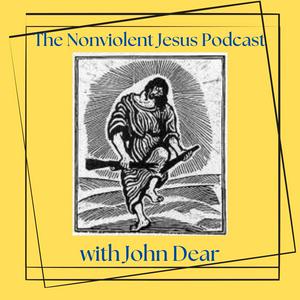On today’s new episode of “The Nonviolent Jesus Podcast,” I offer part 2 of my reflection on my new book, Universal Love: Surrendering to the God of Peace.
If you haven't listened to Part 1 yet, it will be helpful to listen to last week's podcast first. There I tell how the book came about, and why I wrote it.
I conclude the first episode with the story of my visit with Archbishop Tutu in Cape Town, South Africa, where he confided with me his thoughts on free will as the basis of understanding God and our work for peace, justice and nonviolence,
In this 2nd episode, I’ll reflect on the connection between nonviolence and surrendering our will to God, and the political consequences of doing God’s will of peace in a world of war, I also recount many of my experiences with some of the greatest peace activists and peacemakers in the world and how surrender is vital to becoming an extension of Universal Love.
In this concluding part, I explore the connection between surrendering our will to the God of universal love and living nonviolence in our daily lives. Then, I try to unpack the shocking political implications of universal love, peace and nonviolence--if we surrender our lives and our wills to God.
I’ve long wondered what the teachings of the spiritual classics about of abandonment to God mean in this time of permanent war, extreme poverty, white supremacy, fascism, and the real threat of nuclear war and catastrophic climate change. In light of the nonviolent Jesus,
I think if we surrender ourselves to God and do God’s will, we’ll have to step out of ourselves into the world and take nonviolent direct action through selfless service, nonviolent resistance to injustice, and public work for the coming of God’s reign of peace.
No matter how much we love God and want to follow Jesus, we’re all still trying to control God to some extent in order to do our own will, and that’s the problem. In my new book, I invite us to let go of control, let God run our lives, surrender to God’s will of universal love, and enjoy the ride with all its glorious social, economic and political implications, come what may. If we are truly surrendered to God, then God will use us to help disarm the world. That’s the journey.
You can get Universal Love at 30% discount at OrbisBooks.com or by calling 1-800-258-3858, and giving the discount code “JDT.” Please share this message far and wide. I hope you enjoy this special 2 part podcast and get my new book.
www.beatitudescenter.org
www.johndear.org
For more excerpts from the books and other writings, go to https://substack.com/@fatherjohndear
May we all surrender to the God of Universal love and peace.
🌻, Fr. John


